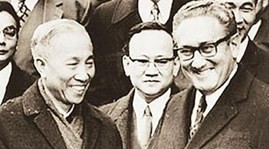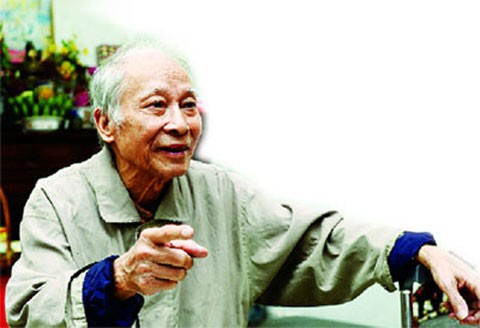(VOVworld)-The agreement ending the war and restoring peace in Vietnam known as the Paris Peace Accords was signed on January 27, 1973 in Paris, one month after the US stopped bombing Hanoi and northern Vietnam. Under the agreement, the US had to withdraw from Vietnam. VOV examines the agreement.
 |
| Chief negotiator of Vietnam Le Duc Tho (L) and his US counterpart Henry Kissinger (R) after the signing of the Paris Peace Accords |
The Paris negotiation was the longest in Vietnam’s national history, continuing for 5 years with 202 public sessions and 24 private meetings. The Paris negotiation was a battle of nerves between US and Vietnamese diplomats. Vietnam’s position was improved by signing the agreement, in which the US recognized Vietnam’s independence, sovereignty, unification and territorial integrity. Vietnam, a country devastated by the war, brought its staunch spirit and strong determination to the negotiation table to defend justice, independence and freedom of the nation. The 12-day Dien Bien Phu in the air campaign was decisive in forcing the US to sign the agreement ending the war in Vietnam. Nguyen Khac Huynh, a former Ambassador and a member of the Democratic Republic of Vietnam’s delegation to the negotiations says: "
The Paris negotiations were long and difficult because it depended on the course of the war. The negotiations were a battle of nerves, strategies, military tactics and stance. We were persistent in negotiation to achieve our ultimate goal of forcing the US to withdraw and end the war in southern Vietnam".

Nguyen Khac Huynh, a former Ambassador and a member of the Democratic Republic of Vietnam’s delegation to the negotiations
|
The Paris Peace Accords reflected the outstanding leadership of the Communist Party of Vietnam and of President Ho Chi Minh and intellectuality of the Vietnamese revolutionary diplomacy, which is based on justice. Vietnam successfully took advantage of support from the former Soviet Union, China and other socialist and non-aligned countries and people throughout the world to set up a front of world support for Vietnam in fighting against the US aggressors. Vo Van Sung, former Assistant to the Vietnamese Foreign Minister and former Vietnamese Ambassador to France says: "The victory of the Paris Accords was due to two main reasons. First, we negotiated with and gained support from France, the host country of the agreement. Second, we successfully mobilized the support og people throughout the world. During the 12-day bombardment in Hanoi, the French Foreign Minister met the Vietnamese delegation almost every day for more information. At that time, it was winter in France but we felt warm because of the support and sentiments of French people, overseas Vietnamese, and international friends".
Nguyen Khac Huynh, a member of the negotiation delegation said that the Paris agreement was a combined victory of people-to-people diplomacy under the leadership of the Communist Party of Vietnam and with support from international friends. "The Paris Peace Accords and the Paris negotiations raised Vietnamese diplomacy to the international level. After the Paris conference, Vietnamese diplomacy developed steadily. Vietnamese people feel more comfortable, easy and equal in international exchanges", said Huynh.
In the 40 years since the Paris Peace Accord, Vietnam has established diplomatic ties with 180 countries and territories, become an equal partner of several world powers and an active and responsible member of several multi-lateral cooperation organizations. Vietnam and the US have normalized their relations and advancing their bilateral cooperation. Lessons on defending national sovereignty and enhancing international solidarity learned from the Paris negotiations retain their significance today.